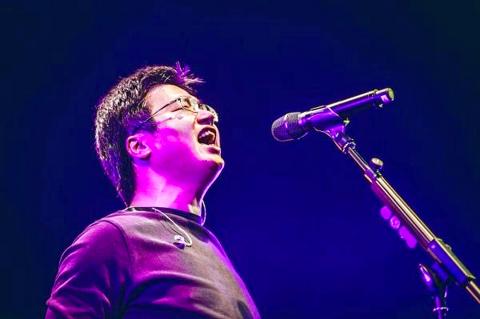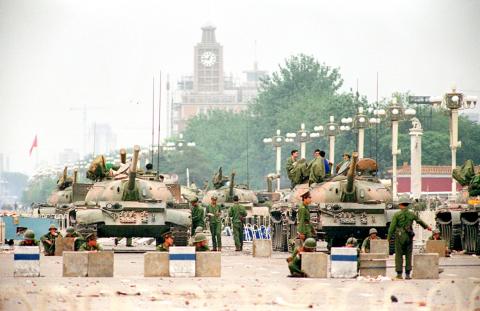It has been three months since Chinese rock musician Li Zhi (李志) disappeared from public view.
First, an upcoming tour was canceled and his social media accounts were taken down. Then his music was removed from all of China’s major streaming sites — as if his career had never existed at all.
Li is an outspoken artist who performs folk rock. He sang pensive ballads about social ills and unlike most entertainers in China, dared to broach the taboo subject of the Tiananmen Square pro-democracy protests that ended in bloodshed on June 4, 1989.

Photo taken from the Internet
“Now this square is my grave,” Li sang. “Everything is just a dream.”
The Chinese Communist Party has pushed people like Li into the shadows as it braces for tomorrow’s 30th anniversary of the military crackdown. Hundreds, if not thousands, are estimated to have died.
The party’s effort to scrub any mention of the movement has been consistent through the decades since then and ramps up before major anniversaries every five years. This year, a trade dispute with the US has added to Chinese government skittishness about instability.

Photo: AFP
“They are certainly nervous,” said Jean-Pierre Cabestan, a professor of political science at Hong Kong Baptist University. “Under [Chinese President] Xi Jinping [習近平], no stone will be left unturned.”
Many of the actions appear aimed at eliminating any risk of individuals speaking out, however small their platforms.
Bilibili, a Chinese video streaming site, last week announced that its popular real-time comments feature would be disabled until June 6 for “system upgrades.”
Chinese Human Rights Defenders, an advocacy group, said that 13 people have either been detained or taken away from their homes in connection with the anniversary. Among them are several artists who recently embarked on a “national conscience exhibit tour” and a filmmaker who was detained after tweeting images of a liquor bottle commemorating June 4.
The bottle’s label featured a play on words using “baijiu” (白酒), China’s signature grain alcohol, and the Chinese words for 89, or “bajiu” (八九). A court convicted four people involved in designing the bottle.
Foreign companies are not immune. Apple Music has removed from its Chinese streaming service a song by Hong Kong singer Jacky Cheung (張學友) that references the Tiananmen crackdown. Tat Ming Pair, a Hong Kong duo of composer Tats Lau (劉以達) and vocalist Anthony Wong (黃耀明), have been deleted entirely from the app. They released a song this month called Remembering is a Crime in memory of the protests.
Wikipedia also announced last month that the online encyclopedia is no longer accessible in China.
While the Chinese-language version has been blocked since 2015, most other languages could previously be viewed, Wikipedia said.
The disappearance of Li has left fans searching for answers.
On Feb. 20, an official social media account for the 40-year-old’s concert tour posted a photograph of its team in front of a truck about to embark on scheduled performances in Sichuan Province.
However, just two days later the account posted an image of a hand wearing what appeared to be a hospital wrist band and the words: “Very sorry.”
The next post, published the same day, announced without explanation that the tour was canceled and that ticket purchasers would shortly receive a refund. Fans flooded the comment section with wishes for a speedy recovery.
However, the suggestion that a health issue was behind the cancelations was later thrown into doubt.
A statement published in April by the Sichuan Department of Culture said it had “urgently halted” concert plans for a “well-known singer with improper conduct” who was previously slated for 23 performances — the same number of concerts that Li had scheduled in the province.
It said that 18,000 tickets were fully refunded.
At about the same time, Li’s presence on the Chinese Internet was completely erased. An April 21 central government directive ordered all Web sites to delete any audio or video content relating to five of Li’s songs, according to China Digital Times, an organization that publishes leaked censorship instructions.
Reporters could not independently verify the authenticity of the directive.
“There’s pretty much a consensus” among those working in the industry that Li’s disappearance from public view is due to the sensitive anniversary, said a music industry professional who spoke on condition of anonymity because of fear of government retribution.
“He did a number of songs that were considered politically risky, making references to June 4, 1989, and so he’s been out of the picture,” the industry professional said.
Li’s songs alluding to the Tiananmen Square protests — The Square, The Spring of 1990 and The Goddess, in honor of a monument to democracy that protesters erected — were part of his earlier works. In recent years, the bespectacled singer has avoided making public political statements, focusing more on promoting his performances.
In 2015, the state-run China Daily published a profile of Li, describing him as a performer who easily sells out concerts. After years of working as an independent artist, he signed last year with Taihe Music Group, a major Chinese record label.
Fans who knew Li as a largely apolitical entertainer expressed bewilderment online about his disappearance. Others made veiled references to China’s Internet censorship.
A fan who has been sharing Li’s music on his personal account spoke to reporters on condition of anonymity because he feared that his employers would punish him for discussing the subject.
“Everyone knows the reason for Li Zhi’s disappearance, but I’m sorry, I can’t tell you, because I follow China’s laws and also hope that Li Zhi can return,” the fan said.
Quoting one of Li’s lyrics, the fan added: “The world will be all right.”
Fans continue to circulate videos of Li’s performances online. His complete discography has been uploaded onto file-sharing Web sites, with back-up links in case the original ones are shuttered. Some users shared tribute art, including a black T-shirt with the words “improper conduct.”
A few years ago, in a performance in Taiwan, Li bounced around on stage, strumming his guitar and repeating a chorus in apparent tribute to the spirit of Chinese propaganda.
“The people don’t need freedom,” he sang energetically.
“This is the best era,” the crowd roared back. “The people don’t need freedom. This is the best era.”

Former Nicaraguan president Violeta Chamorro, who brought peace to Nicaragua after years of war and was the first woman elected president in the Americas, died on Saturday at the age of 95, her family said. Chamorro, who ruled the poor Central American country from 1990 to 1997, “died in peace, surrounded by the affection and love of her children,” said a statement issued by her four children. As president, Chamorro ended a civil war that had raged for much of the 1980s as US-backed rebels known as the “Contras” fought the leftist Sandinista government. That conflict made Nicaragua one of

COMPETITION: The US and Russia make up about 90 percent of the world stockpile and are adding new versions, while China’s nuclear force is steadily rising, SIPRI said Most of the world’s nuclear-armed states continued to modernize their arsenals last year, setting the stage for a new nuclear arms race, the Stockholm International Peace Research Institute (SIPRI) said yesterday. Nuclear powers including the US and Russia — which account for about 90 percent of the world’s stockpile — had spent time last year “upgrading existing weapons and adding newer versions,” researchers said. Since the end of the Cold War, old warheads have generally been dismantled quicker than new ones have been deployed, resulting in a decrease in the overall number of warheads. However, SIPRI said that the trend was likely

BOMBARDMENT: Moscow sent more than 440 drones and 32 missiles, Volodymyr Zelenskiy said, in ‘one of the most terrifying strikes’ on the capital in recent months A nighttime Russian missile and drone bombardment of Ukraine killed at least 15 people and injured 116 while they slept in their homes, local officials said yesterday, with the main barrage centering on the capital, Kyiv. Kyiv City Military Administration head Tymur Tkachenko said 14 people were killed and 99 were injured as explosions echoed across the city for hours during the night. The bombardment demolished a nine-story residential building, destroying dozens of apartments. Emergency workers were at the scene to rescue people from under the rubble. Russia flung more than 440 drones and 32 missiles at Ukraine, Ukrainian President Volodymyr Zelenskiy

Indian Prime Minister Narendra Modi is to visit Canada next week, his first since relations plummeted after the assassination of a Canadian Sikh separatist in Vancouver, triggering diplomatic expulsions and hitting trade. Analysts hope it is a step toward repairing ties that soured in 2023, after then-Canadian prime minister Justin Trudeau pointed the finger at New Delhi’s involvement in murdering Hardeep Singh Nijjar, claims India furiously denied. An invitation extended by new Canadian Prime Minister Mark Carney to Modi to attend the G7 leaders summit in Canada offers a chance to “reset” relations, former Indian diplomat Harsh Vardhan Shringla said. “This is a